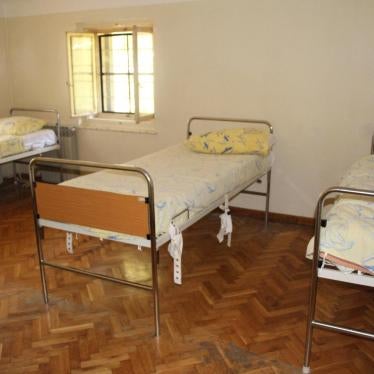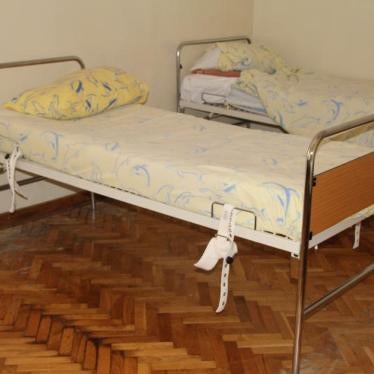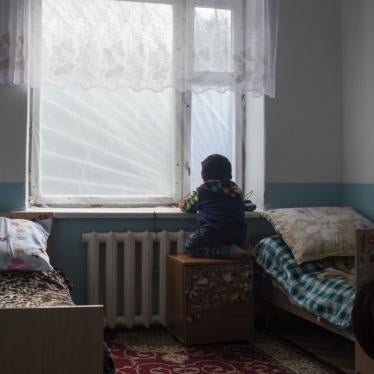October 10, 2018
His Excellency Mr. Andrej Plenković
Prime Minister of the Republic of Croatia
Dear Prime Minister Plenković,
We, the undersigned organizations of persons with disabilities and nongovernmental human rights organizations, are writing to express our concern at the worrisome situation for thousands of women, men, and children with disabilities who live in institutions across Croatia.
We urge you to ensure that every person with a disability has a right to live in the community and to legal capacity, including by reforming laws that are not in line with the UN Convention on the Rights of Persons with Disabilities (CRPD). This year marks the 10th anniversary since Croatia ratified the CRPD.
We acknowledge the important efforts of the Croatian government to ensure the rights of persons with disabilities since the ratification of the CRPD, in particular the government’s deinstitutionalization plan from 2011 and legal capacity reforms from 2014.
We remain concerned, however, about a number of aspects of the government’s policies regarding the right of people with disabilities to live independently in the community and the right to legal capacity, as guaranteed under the CRPD. In particular, we documented that the process of moving people out of institutions and into the community has stalled and that no progress has been made on restoring legal capacity. We detail these concerns and our recommendations to fully promote the rights of people with disabilities in the attached Annex.
We thank you for your attention and remain available for any further discussion with your excellency or a relevant government official on this important matter.
Sincerely,
Inclusion Europe
European Network on Independent Living
Kuca za ljudska prava (Human Rights House)
Centar za mirovne studije (Center for Peace Studies)
Human Rights Watch
Annex
Reduced Efforts to Ensure the Right to Live Independently in the Community
Despite progress from 2011 to 2015, the process of moving people with a disabilities out of institutions and into the community has stalled. According to official data, between 2011 and 2016 the government supported approximately 700 people to move out of state-run institutions and into organized housing in the community. Those who did move are by and large successfully living in their communities, underscoring that deinstitutionalization is both the right thing to do and effective.
Nevertheless, in the first half of 2017, only 15 adults were moved from institutions to independent community living. In the same period, 75 children and 21 adults were reunited with their biological families.
We are concerned about the continued institutionalization and lack of access to community-based support for people with a disabilities. Personal assistance is limited to 1,536 persons with disabilities and is not available to those leaving institutions.
According to 2017 government figures, as of December 2016, more than 7,500 adults and children with disabilities remain in state-run institutions. More than 2,000 others live in privately run, but state-funded institutions, including smaller family homes.
Exclusion of Certain People from Deinstitutionalization Plans
The Croatian government excludes certain people with disabilities from its deinstitutionalization efforts. The 2011-2016 Plan on Deinstitutionalization and Transformation of Social Welfare Homes (“Master Plan”) excluded people with intellectual or psychosocial disabilities who lived in the 24 privately run but state-funded institutions, as well as those living in so-called family homes and foster care. The 2011-2016 Master Plan also excluded people with psychosocial disabilities placed in long-term care, without their consent, in psychiatric hospitals. In an April 2018 meeting with Human Rights Watch, the Ministry of Social Policy promised to adopt a new plan to support community-based living for people with disabilities, including those in state-run institutions, private institutions, and family homes. In a subsequent letter to Human Rights Watch, however, the ministry said that people with disabilities who need long-term and intensive care will remain in institutions. People with psychosocial disabilities in psychiatric hospitals and those in foster care remain excluded from the government’s efforts.
All rights enumerated in the UN Convention on the Rights of Persons with Disabilities (CRDP), including the right to live independently and be included in the community, are guaranteed to all people with disabilities equally, irrespective of their current living arrangement, type of disability, age, the presence of multiple disabilities, or support requirements.
Foster Care for Adults
We are also concerned about the practice of placing adults in foster care. Foster care cannot be considered “independent living in [the] community” for adults as required by the CRPD. The practice of placing adults with disabilities in foster care has been criticized by the UN Committee on the Rights of Persons with Disabilities and the Croatian Ombudswoman for Persons with Disabilities.
According to official data, as of April 2018, more than 2,455 adults with disabilities live in foster care.
People with disabilities have the right to live independently in the community; essential to the realization of this right is control over one’s life and the ability to make individual choices with support as necessary. Any forced placement in a living situation, even with a well-meaning foster family in the community, is not consistent with Croatia’s obligations under the CRPD.
The Right to Legal Capacity
About 18,000 people with intellectual or psychosocial disabilities are placed under guardianship in Croatia and denied their legal capacity or the right to make decisions about basic rights, such as the right to marry and form a family, to sign an employment contract, or to hold property. A significant majority live under full guardianship, under which guardians make all decisions for them. For people under guardianship, the decision on where and with whom they shall live is not made by them but by their legal guardians. This also limits their right to leave institutions.
In June 2014, the Croatian Parliament adopted a new Family Act, which abolished full guardianship. It required courts to review all previous decisions on deprivation of legal capacity with the aim of restoring partial or full legal capacity to those denied it. According to official data, courts have reviewed 1,179 cases, restoring full legal capacity to just 95 people and partial legal capacity to 273.
In its General Comment on CRPD article 12 (legal capacity), the CRPD Committee has articulated that any restrictions on legal capacity are not in compliance with the treaty, including the right to live in the community: “In order to comply with the Convention and respect the human rights of persons with disabilities, deinstitutionalization must be achieved and legal capacity must be restored to all persons with disabilities, who must be able to choose where and with whom to live. In December 2017, the Council of the European Union called on EU governments to ensure that everyone has the right to live independently within their community and to play an active part in society.
We urge you to take steps to reform the laws and policies to meet Croatia’s obligations under the CRPD, including to ensure the right of all persons with disabilities to live in the community and make their own decisions on where and how they want to live. In line with the CRPD, we urge you to create a time-bound plan to phase out the use of institutions as a form of living arrangement for anyone with a disability. Essential to this plan is the creation and implementation of a system of support in decision-making that respects the autonomy, will, and preferences of the person with a disability; improvement and expansion of community-based independent living and support; and specific measures to prevent further institutionalization.








